Remembering Will Campbell: Does Anyone Here NOT Know Amazing Grace?
Memorial Service for Will Campbell, Mt. Juliet, Tennessee
Saturday, June 22, 2013
Sitting under the words “Love your enemies” I feel my heart swell. They are painted on the walls high above the congregation of St. Stephen Catholic Community. As the priest welcomes us to the service, I wish I had been related to Will Campbell. Really related to him. I’m happy to share the name, even if comes from Scottish marauders. When I think about some of Will’s imperfections, I feel an even greater kinship.
Sitting at his memorial service, surrounded by Baptist friends and acquaintances, people who share my admiration for Will Campbell, we hear mostly about his legendary and iconoclastic spirit, about his indomitable love for everyone from young African American Freedom Riders to members of the KKK. You read that right. He took loving everyone seriously and publically. He inspired and challenged me and countless others for decades. Not simply with the stories he wrote, or the cartoon he inspired, but in the way he lived…. by love and grace.
 Cooperative Baptist Fellowship, Fort Worth, Texas | July 21, 1995
Cooperative Baptist Fellowship, Fort Worth, Texas | July 21, 1995
The first time I heard Will Campbell speak in person he ended his speech quoting from his book Cecilia’s Sin (1983), a fictional account based on sixteenth century stories of Anabaptists persecuted for their faith. Will Campbell was larger than life to me. And he was receiving the inaugural Whitsitt Society’s Award for Courage that hot summer day, almost two decades ago. What I remember most clearly was his indictment of those gathered as we listened to his acceptance speech. What had we done lately to be convicted of anything? How had we challenged society’s ruthless rules, or petty injustices? Where was our faith motivating us to any bold thing? He reminded us of how our Anabaptist cousins were arrested. They were brutally tortured and murdered for preaching gospel grace, liberty, and love. Some died for defending women’s call to preach publicly.
He concluded in classic Will Campbell fashion:
So listen carefully now. Do you hear the hoofbeats? Do you hear the chilling anger of the federal agents as they approach. They have documents. It is altogether legal. Caesar has the power. They are coming closer. Do you hear the loud pounding on the door there, the rattling of the latch chain? They are here. We must go with them. We will not cry out.
[long pause]
I don’t hear anything at all. There are no agents, no soldiers there. No hoofbeats. We are not pathetic and certainly we are not huddled in fear. We are rich and secure. Safe from the power of Caesar. We are free to go now. Free to return to the prisonhouse of our own unfaithfulness. The agents are not at the door. It was only the wind. But perhaps, maybe, the wind of John 3:8, the only source of authentic soul freedom.
I suppose the agents of death finally came for Will. He was anything but pathetic and I can’t see him ever huddling in fear (with the possible exception of a WWII foxhole where he claimed no one could possibly be an atheist). He was the epitome of soul freedom.
++++++++++++++
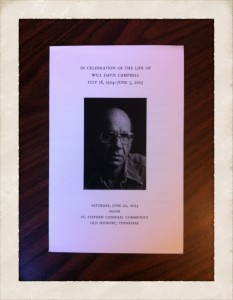 In Mt. Juliet two weeks ago, I loved every minute of the nearly two-hour service remembering Will and celebrating the freedom, faith, wonder and power of his life. I loved that Tom T. Hall had a “no-show-Jones” moment, and was nowhere to be found when it was time to sing. As James Lawson observed later in the service, “There are some things that happened this afternoon that Will probably would be laughing at.”
In Mt. Juliet two weeks ago, I loved every minute of the nearly two-hour service remembering Will and celebrating the freedom, faith, wonder and power of his life. I loved that Tom T. Hall had a “no-show-Jones” moment, and was nowhere to be found when it was time to sing. As James Lawson observed later in the service, “There are some things that happened this afternoon that Will probably would be laughing at.”
In my own heart I believe Will would probably have called Tom a bastard for not showing up to his memorial service. But he would add quickly that God loves him anyway. That was standard Will Campbell fare. Author and friend, John Egerton captured Will D.’s spirit and style perfectly in his eulogy. (You can read more about that here.) And what did Egerton say in the moment of Tom T’s absence? “Does anyone here know the words to Amazing Grace?”
My neighbor in the pew whispered the better question, “Does anyone here NOT know Amazing Grace?”* We rose together and sang in beautiful harmony led by Rev. Edwin Sanders.
If you knew Will Campbell, you knew amazing grace. You could witness it in action in his life. And in his writings. And in his loving inclusion of everyone. . . . even his enemies. The grace of Will was amazing never in a sweet syrupy way, but in a full-on life-giving way.
The Power of Life
Clearly directing the service and giving the homily, civil rights luminary Rev. Dr. James Lawson captured the power of Will’s life and love for all. (You can read a full transcript here.) Lawson found it “telling” that obituaries for Will Campbell’s life “appeared on the front page of the New York Times and the Nashville Tennessean, the Los Angeles Times.” And yet, he lamented, “the media lost a wonderful opportunity to inform the nation about a strand and stream of Christianity” that is not often on front pages . . . Not a Michele Bachmann or Ralph Reed sort of Christianity, but nevertheless a mainstream of Christianity . . . more mainstream than that minority of people who preach absolutism and the despising of some people in our nation and world.”
Lawson said: “the media flunked. Because Will Campbell represents a stream of Christianity . . . not only . . . for the good, the true, and the beautiful, but also [for] social and political and personal love for all humankind and for the neighbor.” He asked: “Of what value can any religion be that does not push us and challenge us to maybe let our hearts and spirits grow at least as large as the magnificent universe of which we are a part, at least as large as the galaxy? . . . That means there can never be a kind of certitude in our society, or in our minds, if we are people of faith and love, and we are people who relish life itself, as Will Campbell did.”
A question
Years ago Lawson asked Will Campbell, “How did you become this way?” He replied: “Our parents insisted that we were to treat everybody with dignity and respect . . . They were peculiarly forceful about the fact that that included the colored of Liberty, Mississippi.” And that “strand of religion,” said Lawson, is one that “has always been here in the nation, always been in the South. . . .”
Lawson recounted stories of the Freedom Rides and of Will’s settling into Nashville and joining First Baptist Church, Capitol Hill, pastored at this time by Kelly Miller Smith.
“That strand of Christianity” preached Lawson is about “the power of character and the power of human life.” He offered an interpretation of Matthew 5:30-48, revising the mistake in verse 39 of the King James tradition, which urges, “do not resist the evil one.” The right translation, says Lawson is this: “Do not violently resist the evil one. Do not imitate the evil.” After reading the passage for many decades Lawson concluded most renderings get it wrong. Instead he says, “Jesus is telling a multitude of ordinary people . . . living in an occupied Galilee. . . . about the power of life that is in every single person. If you and I are willing to tap it and recognize it and use it, life is not impotent or wimpy. The gift of life is a gift of power. This is what Jesus is talking about here.“
A Survival Kit
With Howard Thurman (in Jesus and the Disinherited), Lawson agrees, “the gospel of Jesus is a survival kit for those whose backs are up against the wall, for those who are trapped in the complications of life, and who want to claim their womanhood or manhood. A survival kit. . . It is about the power of life given to every single one of us. And one of the difficulties of our day is that so many of us have surrendered that life-giving power to all sorts of nonsense around us, and thereby in some ways complicate and lose ourselves, our very souls.”
“That,” says Lawson, “was Will Campbell: the power of life that enabled him to walk even-toed with grace and a courage and a truthfulness that attracted all of us to . . . walk with him.”
 The Power of Love
The Power of Love
“And the second thing,” preached Lawson, “is if you have been given the power of life, you have been given at the same time the power of love. They go absolutely together. You cannot have life without the power of love. If you try to live life without the power of love also, you’re going to spoil your life. Perhaps there is nothing so difficult with our own world than that the power structures, whether economic or ecclesiastical or educational or scientific or technological [that] do not recognize that the levers of power … must submit to the power of life and the power of love if they are going to … allow the human race to have a future of infinite possibilities.”
Lawson made a final point. He built on Labi Sifree’s apartheid-era song “something inside so strong, I know I can make it.” Lawson said, “Will had that something within so strong. It was wonder. It was beauty. It was a love of music. It was mystery. It was an awareness of the presence of eternity. It was the courage to do the right, when all others might have been thinking the wrong, that something inside Will.”
He continued, “I don’t know where it came, or how it came. . . . But Will was a strand for us all of a faith, of a religion organized for good, organized for love, organized to include everyone . . . . It is that love I contend that can be the salvation of the human race and the possibility that as sisters and brothers we do not have to accept things as they are, but we can continue to harbor that invisible Mt. Juliet and Nashville and Los Angeles that we know is still possible.”
Make it So
Lawson concluded: “Will might say to each one of us: get life even more committed and walk on and make it so. Amen.”
During and after the service, I felt deeply attracted to this stream of religion in which Will Campbell and James Lawson have been flowing for decades. The power of life and the power of love. By the time I left, I carried out of that sanctuary a clear sense that every shred and morsel of power in our lives, in my life, must be used to live more fully and to love more fully. Only God’s amazing grace makes it possible to live that way.
Greensboro, North Carolina
Wednesday to Friday, June 26-28, 2013
With James Lawson’s sermon still ringing in my ears, and Will Campbell’s way of living life fully and loving others inclusively, still overflowing my heart, I got in my car several days later, and I drove to North Carolina. It was a return to one of my Baptist families. These are some of the same Baptists who met to remember Will. Others I only see once a year. We all gathered for the Cooperative Baptist Fellowship (CBF) and Baptist Women in Ministry (BWIM).
Wednesday
On Wednesday night I met up with nearly 1,200 people to celebrate the 30th Anniversary of Baptist Women in Ministry. We filled First Baptist Church. And we walked together to take bread and wine in remembrance of Jesus and all the saints that have gone before us. I thought of Will Campbell. I thought how he might have grinned at all those women leading. All those changes in 30 years. The power of life and the power of love have been flowing through this stream and strand of Baptist life year upon year. It has been a wilderness for sure.
Our preacher that night, Rev. Nancy Sehested put it in perspective. “Only 10 more years and we’ll reach the promised land.” We laughed because we have come a long way, but we are still wandering in the wilderness. The stream of Baptist clergywomen is stronger than it’s ever been, but still flows in a desert. Many find themselves discouraged, yet as Sehested urged us, we do not lose heart. Instead we share manna in the wilderness, the wine of a new covenant, and a sense of amazing grace. We do not give up yet.
Thursday
On Thursday night Wendell Griffen preached to us. “We’ve been commissioned by God to change the world!” he said. Griffen is an African American preacher and pastor of New Millennium Church, a multi-cultural congregation in Little Rock, Arkansas. He urged the mostly white Cooperative Baptist Fellowship to understand our call as “a mission from God.” I think we are not only on a mission, we are also a mission field. Not just the senders of missionaries, but the recipients of God’s mission from the likes of Wendell Griffen. Will Campbell would surely say so. The CBF still has a long way to go in exercising the power of life to its fullest and love to its most inclusive.
Friday
On Friday night, Suzii Paynter, new executive coordinator of CBF, addressed a crowd of more than 2,500. This moment in time still surprises me. We elected a woman to lead CBF. Amazing grace indeed. She knows us well. And earlier in March, she hit the ground running with her new call. In her first address to the Fellowship, her refrain was: “We can be alone, or we can be a fellowship.” She gave example after example of how to live up to our name and cooperate together. She preached: “Freedom denied to any is ultimately freedom denied to all.” This freedom is an invitation to the power of life lived to its fullest. And to the power of loving inclusively.
I think I felt the wind of God’s Spirit blowing where it willed. And I’m almost sure I heard Will Campbell laughing with delight at the unfolding of it all. Surely amazing grace was flowing through this stream of religion. Surely it was woven like a strand into the relationships and lives and loves of these Baptists.
Did anyone there NOT know amazing grace?
* Thanks to Don Durham for that question and the title for this post.
This post first appeared on the Associated Baptist Press blog.

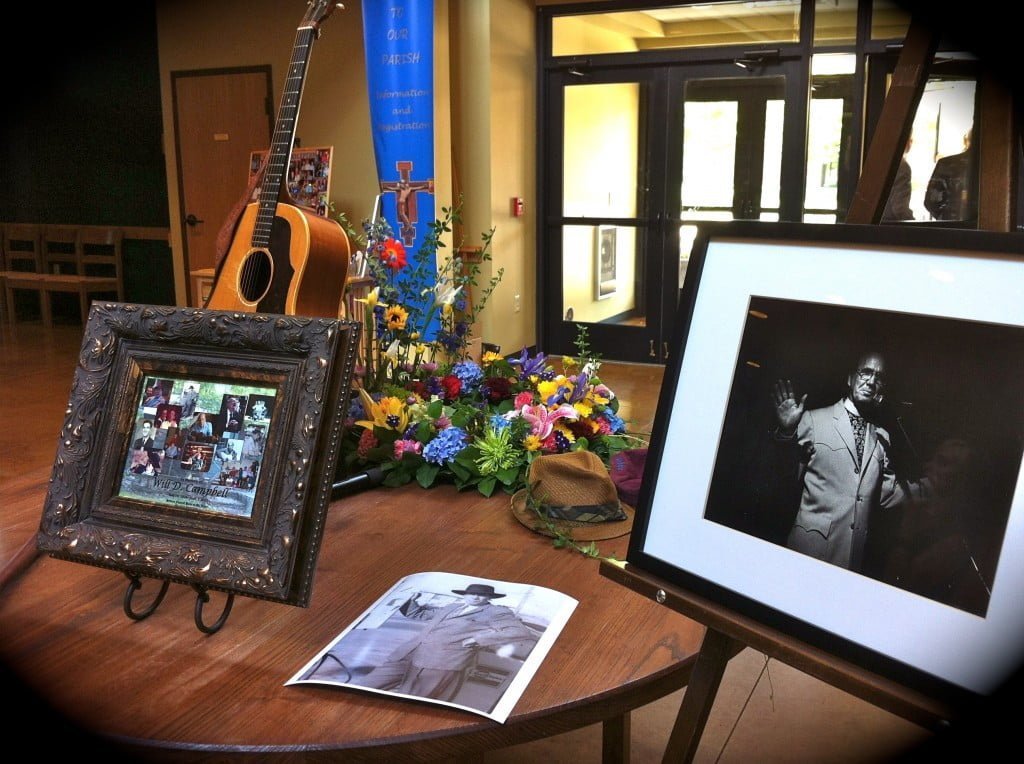
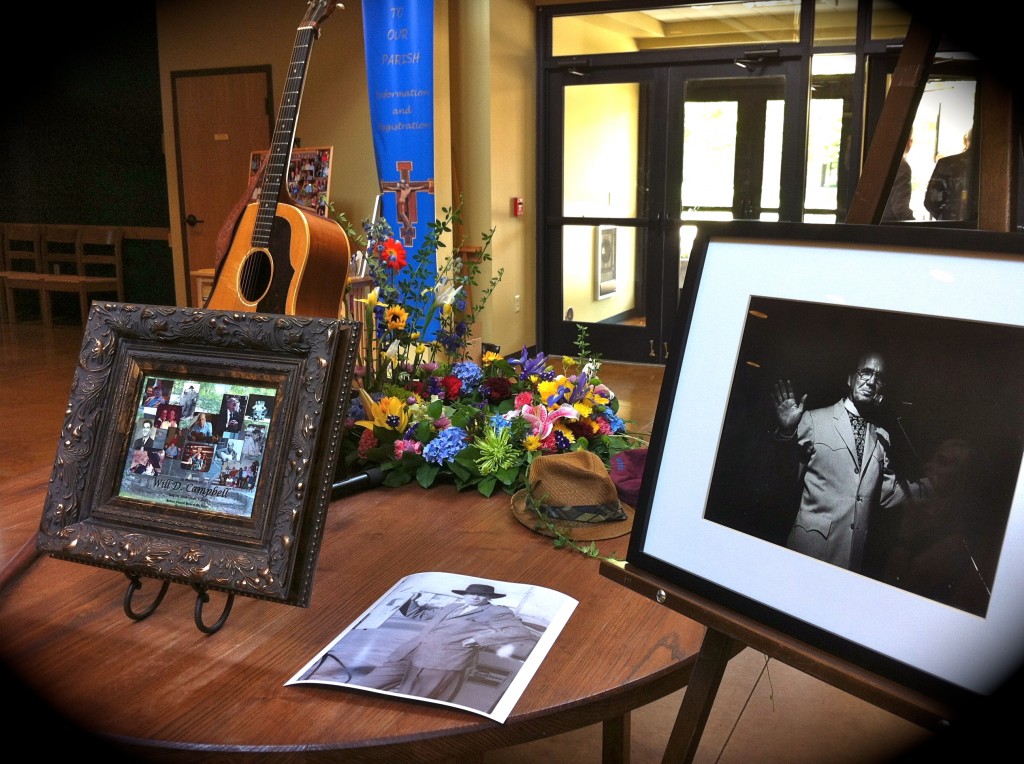
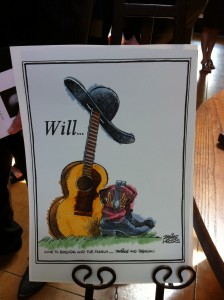
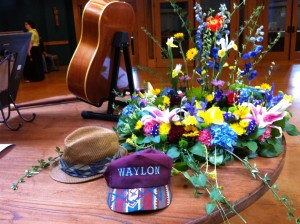



Thank you for this remembrance and hope, Eileen. I didn’t know Will had died. He spoke at a Lutheran youth gathering when I was 15 or so–in the 1970s. I have followed his writing since. I’m grateful for this window on his life and the memorial.
Thanks, Mary! I’m glad to share this connection with you.
Will was an amazing and inspiring person.
Blessings to you in your new work!